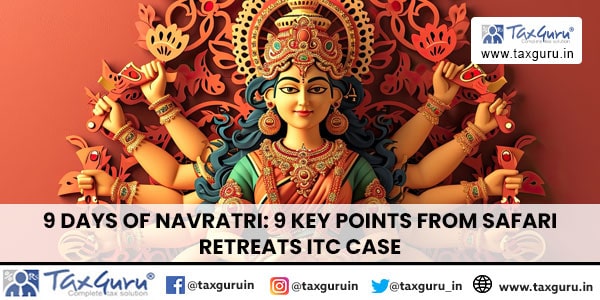Arjuna: Krishna, as we celebrate the 9 days of Navratri, each day filled with its unique significance and blessings, I’ve heard the Safari Retreats judgement brings its own lessons for businesses. Can you help me understand the 9 key important points from this case that businesses should learn?
Krishna: Arjuna, just like Navratri has 9 days, each with a special meaning, the Safari Retreats judgement offers 9 key points for businesses when it comes to claiming Input Tax Credit (ITC) under GST. Let’s explore these 9 key points, one for each day of Navratri:
1. ITC on Construction Expenses
The Safari Retreats case revolves around whether businesses can claim ITC on the goods and services used during the construction of immovable properties, like a mall. Their idea was to use this ITC to offset the GST on rental income from renting or leasing out the mall’s shops. The company’s objective was to effectively utilize the ITC and prevent a cascading tax effect. This is the starting point of the case, just as Navratri begins with the first day’s focus on new beginnings.

2. Sections 17(5)(c) and 17(5)(d) of CGST Act
The government challenged Safari Retreats by referring to Sections 17(5)(c) and 17(5)(d) of the CGST Act, which block ITC on construction expenses for immovable properties. This point reflects the obstacles faced, similar to the second day of Navratri, which represents strength to overcome challenges.
3. The Functionality Test
The Supreme Court applied a functionality test to determine whether a mall could be classified as a “plant” for ITC purposes. The key here is that if the building is essential to the business, it could qualify for “Plant” and eligible for ITC. This lesson reminds us of the third day’s theme of growth and empowerment, as businesses can empower themselves with the right interpretations.
4. The Debate of ‘And’ vs. ‘Or’
One of the most crucial points in this case is the interpretation of the terms “plant and machinery” versus “plant or machinery.” The court ruled that the law’s use of “or” allows flexibility in claiming ITC, as it doesn’t require both plant and machinery to be present. This point relates to the flexibility and adaptability taught on the fourth day of Navratri.
5. Clarification on “Plant” or “Machinery”
Businesses must understand that a structure like a mall could qualify as a “plant” if it is essential to the business’s operations. This clarification offers a deeper understanding of how businesses can claim ITC, just as the fifth day of Navratri symbolizes wisdom and learning.
6. The Supreme Court’s Remand
Though the Supreme Court didn’t give a final ruling, it remanded the case to the Orissa High Court to apply the functionality test. This reflects the patience and perseverance of the sixth day of Navratri, as businesses will have to wait for the final outcome of the case.
7. The ₹34 Crore ITC Potential
If the mall qualifies as a “plant,” Safari Retreats stands to gain ₹34 crore in ITC benefits. This potential windfall represents the wealth and prosperity that come on the seventh day of Navratri, showing businesses the financial rewards they can achieve through correct legal interpretation.
8. Impact on Other Businesses
This case sets a precedent for other businesses involved in constructing malls, hotels, or commercial properties. If their structures are classified as “plant,” they too can claim ITC. The eighth day of Navratri symbolizes unity and collective strength, as businesses can benefit from this judgement.
9. The Ultimate Lesson for Taxpayers
The final lesson, like the blessings of the ninth day of Navratri, is one of clarity and understanding. Businesses must carefully interpret tax provisions, paying attention to even the smallest details like “and” versus “or.” By doing so, they can avoid unnecessary costs and optimize their tax benefits. Just as Navratri teaches us devotion and attention to detail, businesses must be diligent in their tax practices.
Arjuna: Krishna, these 9 points truly feel like the 9 gifts of Navratri! Each lesson offers businesses a way to better understand the GST laws and how they can benefit.
Krishna: Exactly, Arjuna! The Safari Retreats case reminds us that success in tax matters, like in life, comes from careful attention to detail, interpretation, and understanding. Just like Navratri’s blessings, if businesses keep these lessons in mind, they can reap significant benefits.




